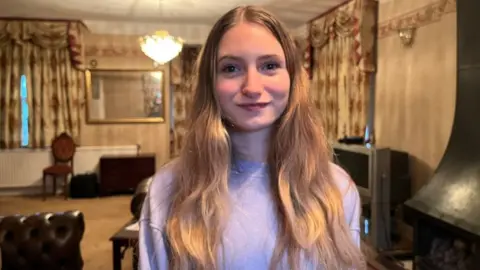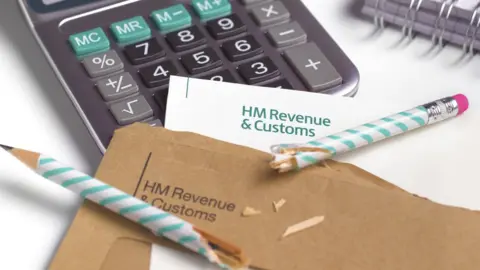Basic income: Wales pilot offers £1,600 a month to care leavers
 Getty Images
Getty ImagesEvery 18-year-old leaving care will be offered £1,600 a month for two years under a Welsh government basic income pilot.
It is expected about 500 people will be eligible to join the scheme, which could cost up to £20m.
Officials said it was the highest amount offered on a basic income scheme anywhere in the world.
The Welsh Conservatives said it was a waste of money while Plaid Cymru called for the pilot to be expanded.
The £1,600 a month will be taxed and is expected to be counted as income by the UK government, meaning it would affect someone's eligibility for benefits.
It will be unconditional and will not be withdrawn if participants get a job.
But the Welsh government is no longer calling the plans a pilot of Universal Basic Income (UBI), where a wider group of people would be given a regular sum of money.
Ministers want to test out how the payments could help care leavers be better placed for their transition into independence as adults.
Social Justice Minister Jane Hutt said the plans would "deliver financial stability for a generation of young people that need it most".


A teenager who has foster parents said the pilot could make care leavers "equal with everyone else".
Milly, 17, represents the National Youth Advocacy service on the Welsh Youth Parliament and has spoken openly about her care experiences.
She said the pilot was a good opportunity, adding people in care were "disadvantaged financially and this will bring us level".
She said it would be a "safety net" for those who have been in care who may not have support from their families.
"Many have been damaged, physical and mentally - this can help pay for private counselling or therapy as often public waiting lists for these services are so long."
Although she welcomes the announcement, Milly still has questions about how the payments will be rolled out: "I'd like to see evidence that everyone in care will be entitled to it."

 Getty Images
Getty ImagesHow will it work?
Every person leaving care at the age of 18 for the first 12 months of the pilot will be offered the chance to take part.
They will receive payments for 24 months, amounting to an income worth £19,000 before tax annually, with the first payment a month after their 18th birthday.
Officials say it is equivalent to the real living wage and will be taxed at the basic rate.
Laura Tams, 42, from Pontardawe, who has been fostering for six years, told BBC Radio Wales additional support was also needed for young people leaving care.
"These children have been through things that to you and I belong in nightmares. We cannot all of a sudden expect them at 18 to be able to run a house and to spend that money wisely."
Welsh officials are also promising extra support for those taking part, such as financial wellbeing training.
There is no date for when the scheme will be launched, although officials said it was likely to be in the summer.

 Alex Sommerville
Alex SommervilleFormer youth worker Alex Sommerville, who left care when she was younger, told BBC Radio Wales Breakfast with Claire Summers she did not believe the scheme would encourage care leavers to find work, or study further.
Ms Somerville, from Swansea, said: "Some would still want to go for education or work, but there is a part of me thinking, if you're getting that wage every month, why would you?"
"I'm very worried about giving young people all of that money and expecting them to know how to spend it in the best way for themselves."
Welsh Conservative spokesman for social partnership Joel James said trials had shown basic income failed to incentivise work and had proven to be a "waste of public money".
Plaid Cymru's economy spokesman Luke Fletcher said it was a step in the right direction but needed a "structure around it to enable it to meet the ambition of addressing poverty and unemployment, as well as improving health and financial wellbeing".
 Getty Images
Getty ImagesWhat is the difference between Universal Basic Income and Wales' plan?
UBI is where a government pays all individuals a set amount, regardless of their means.
Backers say it could help reduce poverty and be easier and less stressful to navigate than more complex means-tested benefits, but opponents say it is extremely costly and not targeted at those who need it.
Once it was announced that the pilot would focus on care leavers, critics argued it was not actually universal.
The Welsh government had initially described it as a pilot of UBI, but has now stopped doing so.
Asked why it was not a trial of UBI, Social Justice Minister Jane Hutt told BBC Wales that the government needed "to be realistic". and the pilot needed to be "meaningful in terms of the funding".
A basic income for care leavers has been tried in Santa Clara, California, where 72 young adults received $1,000 (£739) initially for 12 months.
In Finland, research on a basic income pilot with jobless people for two years found it did not lead them to find work, although they felt happier.
The Welsh government plans were welcomed by the Joseph Rowntree Foundation, a charity which researches poverty in the UK.


To match the level of basic income for care leavers at about the real living wage is bold.
With so many people in Wales paid only the national minimum wage there may well be those who think the offer to care leavers is over-generous.
But in economic terms if the project is successful and results in better paid work and healthier lives, the long-term benefits would flow back into the economy.
While this is not is a pilot of UBI, its outcomes will be relevant to the debate around that.

- HAYLEY PEARCE PODCAST : Tackling the issues that make your group chats go off
- I WAS THERE: Real life experiences from major moments

